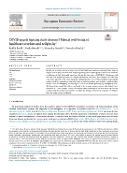| dc.contributor.author | Barili, Emilia | |
| dc.contributor.author | Bertoli, Paola | |
| dc.contributor.author | Grembi, Veronica | |
| dc.contributor.author | Rattini, Veronica | |
| dc.date.accessioned | 2024-10-29T15:41:03Z | |
| dc.date.available | 2024-10-29T15:41:03Z | |
| dc.date.issued | 2024 | |
| dc.identifier.uri | https://hdl.handle.net/20.500.14178/2672 | |
| dc.description.abstract | Relying on a unique survey of more than 15,000 healthcare workers conducted from June to August 2020 in Italy, we show that religious priming caused participants to have a less dramatic recollection of their distressful experience during the first wave of COVID-19. Consistent with the view that religiosity serves as a coping mechanism, this effect was stronger for those who were more exposed to the virus categories during the first wave of the pandemic (e.g hospital workers) and for respondents who faced more stressful situations, such as being reassigned due to the COVID-19 emergency, or working in a COVID-19-related specialty (e.g, emergency care). All things being equal, the effect was found to be stronger among nurses, who indeed were identified as "COVID angels"during the intense media campaign of the first wave. We find no evidence that the results are sensitive to either the timing of the survey response or distance from the main events recollected. | en |
| dc.language.iso | en | |
| dc.relation.url | https://doi.org/10.1016/j.euroecorev.2023.104649 | |
| dc.rights | Creative Commons Uveďte původ 4.0 International | cs |
| dc.rights | Creative Commons Attribution 4.0 International | en |
| dc.title | COVID angels fighting daily demons? Mental well-being of healthcare workers and religiosity | en |
| dcterms.accessRights | openAccess | |
| dcterms.license | https://creativecommons.org/licenses/by/4.0/legalcode | |
| dc.date.updated | 2024-10-29T15:41:02Z | |
| dc.subject.keyword | Healthcare workers | en |
| dc.subject.keyword | Mental well-being | en |
| dc.subject.keyword | COVID-19 | en |
| dc.subject.keyword | Coping mechanisms | en |
| dc.subject.keyword | Religiosity | en |
| dc.identifier.eissn | 1873-572X | |
| dc.relation.fundingReference | info:eu-repo/grantAgreement/MSM//LX22NPO5101 | |
| dc.date.embargoStartDate | 2024-10-29 | |
| dc.type.obd | 73 | |
| dc.type.version | info:eu-repo/semantics/publishedVersion | |
| dc.identifier.doi | 10.1016/j.euroecorev.2023.104649 | |
| dc.identifier.utWos | 001166246600001 | |
| dc.identifier.eidScopus | 2-s2.0-85182562727 | |
| dc.identifier.obd | 645986 | |
| dc.subject.rivPrimary | 50000::50200::50201 | |
| dcterms.isPartOf.name | European Economic Review | |
| dcterms.isPartOf.issn | 0014-2921 | |
| dcterms.isPartOf.journalYear | 2024 | |
| dcterms.isPartOf.journalVolume | 162 | |
| dcterms.isPartOf.journalIssue | February 2024 | |
| uk.faculty.primaryId | 118 | |
| uk.faculty.primaryName | Fakulta sociálních věd | cs |
| uk.faculty.primaryName | Faculty of Social Sciences | en |
| uk.department.primaryId | 319 | |
| uk.department.primaryName | Institut ekonomických studií | cs |
| uk.department.primaryName | Institute of Economic Studies | en |
| uk.department.secondaryId | 328 | |
| uk.department.secondaryName | Katedra evropské ekonomické integrace a hospodářské politiky | cs |
| uk.department.secondaryName | Department of European Economic Integration and Economic Policy | en |
| dc.description.pageRange | nestránkováno | |
| dc.type.obdHierarchyCs | ČLÁNEK V ČASOPISU::článek v časopisu::původní článek | cs |
| dc.type.obdHierarchyEn | JOURNAL ARTICLE::journal article::original article | en |
| dc.type.obdHierarchyCode | 73::152::206 | en |
| uk.displayTitle | COVID angels fighting daily demons? Mental well-being of healthcare workers and religiosity | en |

